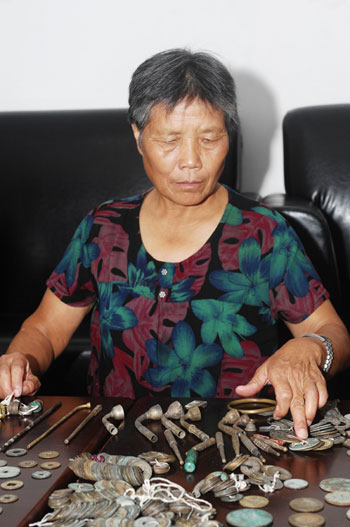Collector picks up pieces of the past
Updated: 2011-11-24 07:34
By Guo Rui (China Daily)
|
|||||||||||
XIANGYANG, Hubei - In an era when cultural relics can bring in big profits, collector Qin Furong is taking a step to the side.
The former street cleaner in Xiangyang, Hubei province, who retired in 1995, found that life after work was not that appealing.
"I disliked the slow pace after retirement," said the 66-year-old.
|
 Qin Furong shows her collection in Xiangyang, Hubei province. |
To kill time, she went around on the streets by bike, sometimes clearing rubbish along the Hanjiang River, a tributary of the Yangtze River.
One day she found some copper coins on the riverbank and at nearby construction sites, and took them home. She didn't realize the true value of her lucky discoveries until a few months later when she was reached by some ancient coin buyers.
"For some of the coins, they paid me 30 to 40 yuan ($5 to 6) each. The price was beyond what I had expected," she said.
As more and more such buyers approached her to purchase coins, she wondered why they targeted such "useless" old stuff. After careful research, she came to realize that what she had picked up were in fact antiques with rich cultural meanings.
"They are real historical treasures for our nation!" she said.
So Qin rejected all the buyers' inquiries and refused to sell her coins. Since then, she has come to the river every day before dawn, hunting for pieces of the past.
She is not the only one looking for antiques along the river, however.
"But I collect to protect and donate them to the government, rather than sell them for money," she said.
She has collected coins, gold rings, silver bracelets, glazed ceramic chips and more than 2,000 pieces of bronze ware.
When asked if she has any regrets during her 15-year journey of digging, she recalled an old button-like tablet inscribed with the words "resist against Japanese aggression and save the nation". She kept it in her pocket but later could not find it anywhere.
"It must be a precious souvenir and has historical value. But it's a pity I've lost it."
Last year, Qin donated more than 2,000 valuable antiques to the city museum without asking for any compensation or benefit. Her collections were put on display for the public in June.
Yet her selfless deeds seemed silly for those who live on picking up relics on the riverbank.
"Her retirement income is about 1,000 yuan, but one of the ancient coins may be worth 3,000 yuan," Ke Linyun, a woman who also picks up relics along the river, told China Daily.
Qin's three sons, however, completely understand their mother's decision, and they have never asked Qin to sell her collections.
"If I donate them to the country, future generations will enjoy them. But if I sell them, only some of the people could see them," Qin said, adding that she will continue searching for antiques as long as she is able.











